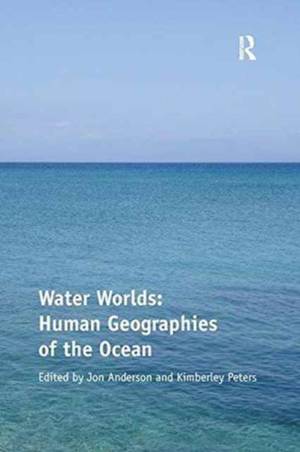
- Retrait gratuit dans votre magasin Club
- 7.000.000 titres dans notre catalogue
- Payer en toute sécurité
- Toujours un magasin près de chez vous
- Retrait gratuit dans votre magasin Club
- 7.000.000 titres dans notre catalogue
- Payer en toute sécurité
- Toujours un magasin près de chez vous
102,45 €
+ 204 points
Format
Description
Our world is a water world. Seventy percent of our planet consists of ocean. However, geography has traditionally overlooked this vital component of the earth's composition. The word 'geography' directly translates as 'earth writing' and in line with this definition the discipline has preoccupied itself with the study of terrestrial spaces of society and nature. This book challenges human geography's preoccupation with the terrestrial, investigating the terra incognita of the seas and oceans. Linking to new theoretical debates shaping the geographic discipline (such as affect, assemblage, emotion, hybridity and the more-than-human), this volume unlocks new knowledge concerning the human geographies of ocean space. The book casts adrift stable, bounded and fixed conceptions of space and advances geographical understanding based on the world as 'becoming', changing, mobile and processional. This ontology supports the notion that the oceans are not simply fluid in a literal way, but also in a conceptual sense, suggesting that the seas have their own fluid natures - their own capacities and agencies - which are co-fabricated with social and cultural life. This book features twelve chapters, authored by key academics contributing to this growing field of research. The book is divided into three sections, including an Introduction by the editors and a foreword by Prof. Philip E. Steinberg, the leading scholar in the field of maritime geographies. The first section of the book considers the ways in which different watery spaces from the Atlantic Ocean to the Mediterranean Sea have been conceptualized, theorized and 'known' through metaphors, voyages of discovery and scientific endeavour. The second section examines how oceans are experienced; through various activities including driving on water, kayaking in water and diving under water. The final section explores the relations between human life and the nature of the sea as a material, mobile and more-than-human spa
Spécifications
Parties prenantes
- Auteur(s) :
- Editeur:
Contenu
- Nombre de pages :
- 214
- Langue:
- Anglais
Caractéristiques
- EAN:
- 9781138248656
- Date de parution :
- 09-09-16
- Format:
- Livre broché
- Format numérique:
- Trade paperback (VS)
- Dimensions :
- 156 mm x 234 mm
- Poids :
- 308 g







